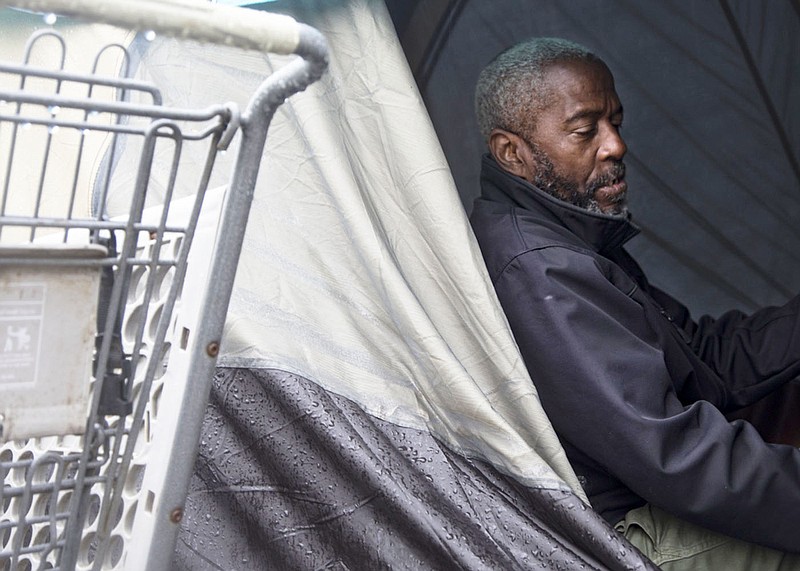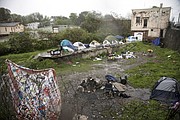Leaders from Chattanooga, Hamilton County and the state are struggling to come up with a solution for temporarily housing the city's homeless population during the growing COVID-19 crisis.
According to Chattanooga Director of Special Projects Tyler Yount, the city began working on a contingency plan for homeless citizens who need a space to quarantine after being tested for the virus and those who are confirmed as ill and in need of isolation and care.
"We started working on this as soon as we were aware this was going to be an issue and people might need a place to quarantine," Yount said. "But the problem has been knowing that we can't shelter those who are confirmed cases with those who are only suspected.
"We have to have different rooms and bathrooms to prevent cross contamination and getting anyone else sick."
Last week, the most tangible plan yet for providing this population a living space in which to quarantine or recover fell apart in its infancy, highlighting the uncertainty for this population.
State Rep. Yusuf Hakeem, D-Chattanooga, said he was told the city hoped to move some groups of homeless Chattanoogans to Harrison Bay and Booker T. Washington state parks, which are out in the country, a move Hakeem voiced concerns over. He called the governor's office, as did several colleagues in the legislative delegation.
At the time, Hakeem told the Times Free Press, he believed it would make more sense for the vulnerable population to remain within the the city and closer to health care providers. Chattanooga Mayor Andy Berke later told several lawmakers his administration had already changed course.
While Yount said the government agencies have largely been working together, specifically citing county emergency management as a "great partner" on the issue, he recognized some hang-ups in the parks plan. He said a longstanding stigma against homeless people makes it harder to navigate a crisis solution.
"It's really hard to logistically work out a plan when you're flying in the dark and don't know how many people you need to house or will need to house or for how long," Yount said. "But I also think there's some of the same attitude that we're dealing with on the Main Street project working against us.
"Some people don't want them here, some people don't want them there, but they have to have somewhere safe and sustainable to go."
After the Main Street project idea fell through, the city was sent back to the drawing board to find another multi-family dwelling that would allow an unknown population of homeless people a place to self-isolate as they are monitored for the virus and to recover if any are diagnosed.
"We cover cradle-to-grave and everything in between, so there has to be a way to help shelter these people," Hamilton County Emergency Management Agency Director Chris Adams said. "We are of course trying to connect the city with the right people to help them come up with a solution since the other thing fell apart. We don't know if we'll have one or 60 people who need this shelter, but we don't want to find ourselves in a spot where we need a place for these or any other people and we haven't planned for it."
With the county agency supporting city efforts, Yount is now working with the local Salvation Army to create a space for those who are confirmed ill and homeless, at the request of local hospitals, which the Salvation Army has agreed to manage.
"Those who are unhoused, live in poverty or close to poverty will be hit the hardest in this crisis and the Salvation Army is no stranger to responding to emergencies. Of course we are willing to help the city," Kimberly George, director of marketing and communication at the Salvation Army of Greater Chattanooga, said Wednesday. "Our goal is as soon as possible, but you know it's bureaucracy."
Neither the city nor the Salvation Army have confirmed where the facility will be, how many people it can house or when it will open.
According to Yount, the city's outreach team has been working to identify - but has not found - any homeless people who are suspected to have the virus, though hospitals have reported a handful of suspected such people who have been tested but don't have anywhere to be discharged for quarantine and are therefore considered to be homeless.
The city is not aware of any confirmed cases among the homeless population at this time, Yount said.
"We're looking for a place for both of these groups because we know, eventually, this is likely to become an issue," Yount said, noting that the tentative Salvation Army plan does not account for those waiting on test results. "We're not sure what it looks like yet but we are doing everything we can and working with nonprofits, the county and anyone else we need to to find these solutions in this situation."
Contact Sarah Grace Taylor at staylor@timesfreepress.com or 423-757-6416. Follow her on Twitter @_sarahgtaylor.

